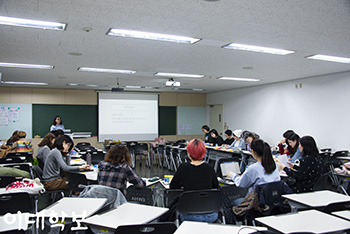
From March 12 to 21, six organizations – Ewha Searcheye, Ewha Student Minority Council, Stranger Ewha, Ewha Independent Library, Byunnal, and Solchan – came together to open the 1st Relay Seminar, “Who Stole My Pie?”
Throughout the six-day period, each organization took turns holding a seminar on the rights of the disabled, sexual minorities, and immigrants.
“After the surge of interest in women’s rights last year, there have been several attempts in Korea to discuss agendas on social minorities,” said one of the organizers of the seminar.
“However, the discussions were held in a confined atmosphere where there was a fixed presumption of what was considered ‘normal.’ We wanted to organize seminars where students could freely talk about such agendas without constraints and seek solutions for social issues together.”
Ewha Voice attended two seminars, “Coming out + Outing” and “Animal as a Woman, Woman as an Animal.”
Should “Outing” be Banned?
On March 19, Ewha LGBTQ+ student club Byunnal started the seminar by presenting the definitions of “coming out” and “outing” and the relation between the two.
A member of Byunnal explained that in Korea, the common understanding of “coming out” is a person’s self-disclosure of sexual identity, while “outing” is a disclosure without the person’s consent.
However, in the U.S., the term “outing” is frequently used when exposing the sexual orientation of public figures, such as politicians, in order to reveal their hypocritical attitude towards LGBTQ+ communities.
Suppose a politician who is homosexual but has yet to come out to the public is promoting anti-gay legislations or actions. When someone publicly discloses his sexuality in order to criticize his behavior and to protect the rights of sexual minorities, it is called “outing.”
There are different definitions and opinions towards this act – it can be seen as a violation of one’s privacy and, at the same time, can be one of many ways to prevent constant discrimination of sexual minorities. In order to have a chance to consider such conflict, the presenter of the seminar raised a challenging question on whether banning outing would actually improve the rights of sexual minorities.
“When we say someone is ‘outed’ by somebody, it often entails that person has come out to at least one person,” said a member of Byunnal.
“This can mean that in order for sexual minorities to avoid being ‘outed’ publicly, they have to keep their sexuality a secret, not letting a single person acknowledge it. That makes it more difficult for minorities to freely express themselves. We have to change the current perception of societies where they are treated unfairly and prone to possible hate-crimes. Simply criminalizing outing to prevent potential damage ignores the correlation between coming out and outing.”
After the presentation, more than 15 people carried a heated discussion on outing. One of the participants said that she realized how passive she was in promoting minorities’ rights.
“Although the two-hour seminar wasn’t enough to fully understand their experiences, it surely was an opportunity for me to look back on myself and share the passion of making a better world with other participants,” she said.
The Correlation between Veganism and Feminism
The seminar began with a video of a man inviting his neighbors over for a delicious meal, but after the neighbors realized that they were eating a golden retriever, they all stopped eating.
The video intended to criticize people having inconsistent attitudes towards different species of animals, those who agree with consuming chicken or pork but not dogs, when in fact all animals are sentient beings. This concept is called “carnism,” a belief system that allows people to eat certain species of animals.
“Our schema confines our thoughts by categorizing animals into ‘animals we can eat’ and ‘animals we shouldn’t eat,’” said a member of Solchan.
“Just like there aren’t certain ‘types’ of women that can be raped, there shouldn’t be certain species of animals we can eat.”
Also, the presenter stated that when looking at the production process of milk and eggs, we can easily find violence.
“Milk is a product that only comes from pregnant cows, which means that cows are exposed to rape, unwanted pregnancy, and unwanted separation from their babies,” she said. “In the case of eggs, they are cultivated from mutated chickens that produce 30 eggs a month, which is three times the amount of eggs they normally produce. These animals are being exploited, and their sole purpose of life is to produce food for humans.”
The seminar further talked about the correlation of feminism and veganism and how paradoxical humans’ perspectives are.
“Veganism is not a preference; rather, it is an issue of morality,” said one of the participants.
“In order to truly care for the rights of animals, we should change our diets to vegan.”

